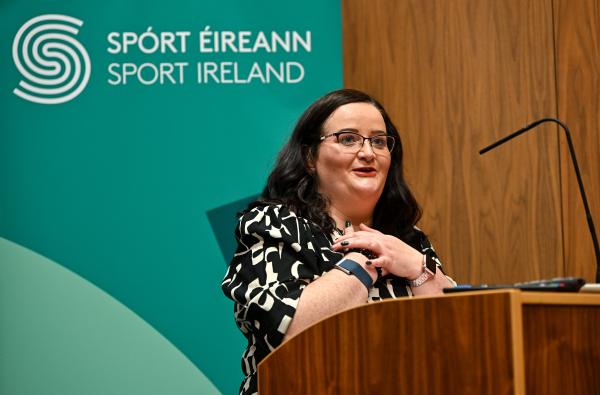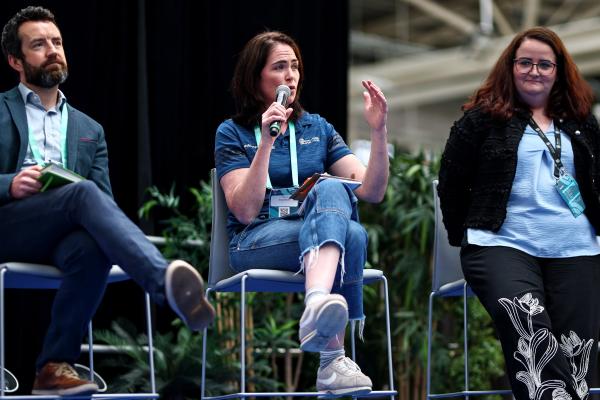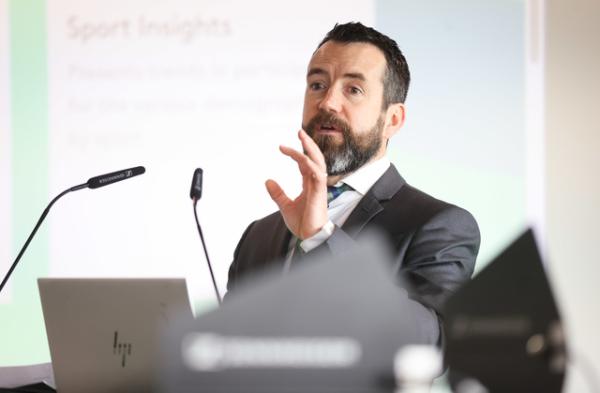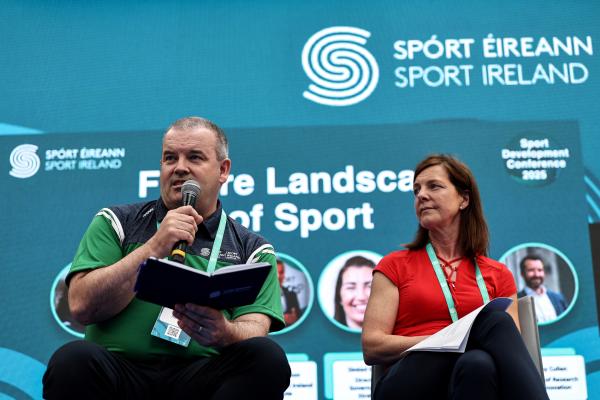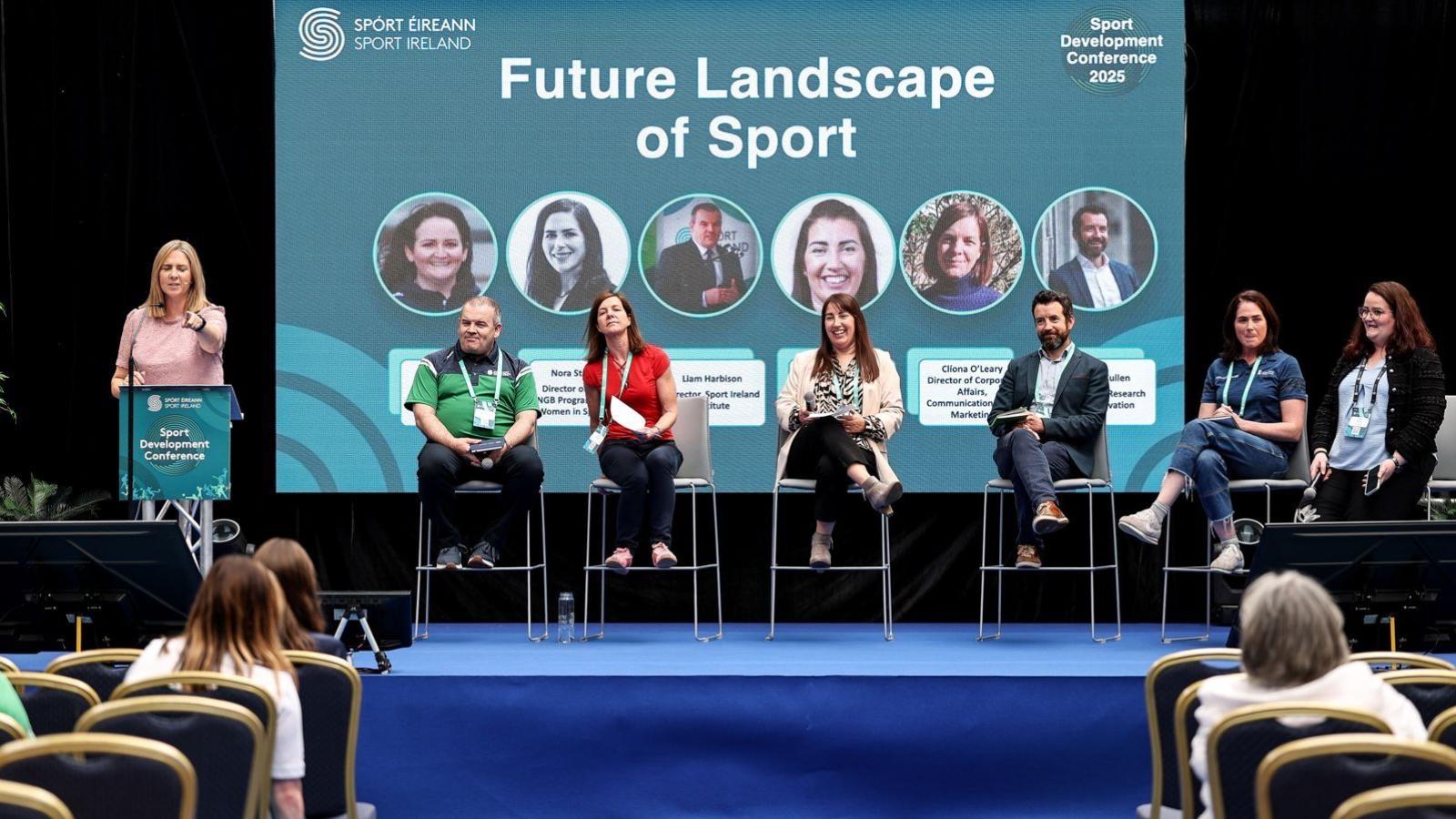
Three minutes, four visions: Sport Ireland directors on sport’s biggest challenges - and opportunities
Earlier this year Sport Ireland hosted the Sport Development Conference which brought together more than 300 development staff from across the Local Sport Partnership (LSP) and National Governing Body (NGB) network, as well as other funded bodies.
As the event drew to a close Sport Ireland directors took to the stage in the National Indoor Arena to reflect on the challenges and opportunities faced by the sector – with the catch being that they only had three minutes to do so. The following are some key remarks from four of the presentations.
Louise Burke, Director of Participation
“What a fantastic opportunity to speak with you all today at our flagship event, Sports Development Conference, about the upcoming challenges and opportunities we face.
“There is a lot happening within the sector and in participation specifically.
“From a national point of view the Government have prioritised participation as a key metric of success. Hence why we have seen growing investment in the area. We are also working more closely with various Government departments on how we can align our priorities and funding to deliver in a more effective and efficient way.
“We have huge ambition and drive to get more people active and engaged in sport and we have this incredible sector which is just so committed to changing lives on the ground.
“We recognise the limitations that comes with that, it's around resources, and funding and I think that's always going to be our challenge, but we've become so creative in the way we deliver. We need to prioritise further collaboration, we need to find ways, collectively, to work more closely together to achieve the goals of government, of Sport Ireland and of our individual organisations.
“Key policies coming up that impact the work of Participation are Sport Ireland’s new Participation Plan, Government’s new National Physical Activity Plan and the new National Sports Policy from Government. All have huge influence in how we go about participation both locally and nationally.
“Pairing of all that with Get Ireland Active and the potential impact it will have on how we’ll plan and develop sport in Ireland, the future - although challenging - looks very bright!”
Nora Stapleton, Director of Strategic National Governing Body Programmes and Women in Sport Lead
“When you see what's happening in other countries around the world there’s a fear that the positive steps that have been taken in terms of women in sport could just get wiped away by, you know, key decision makers making decisions for females in the population.
“So there's a fear about that but, I hope, that we're building enough male allyship which is why we have the session upstairs [Tyrone All-Ireland winner and Míde Research academic Conor Meyler, presented ‘Stronger Together: The Role of Men and Male Allies in Advancing Gender Equality in Sport’] and it's something that we want to focus on and we want to ensure that men, women of course, but especially men feel more connected to women in sport and realise just how important they are in that drive as well.
“I'd probably say in terms of where the opportunities are, it’s back to that piece around being more innovative and being more collaborative. When you look at the way we offer sports, I feel we have to start changing it.
“We have to look at our membership and models, we have to offer more short-term membership in NGBs, joint members, NGB membership, we have to allow people and encourage people to play and be members of more clubs. Where are the multi-sport options? Where are the clubs within clubs? Yes, they exist in places but it's not widespread, so I think we need to do more of that.”
Benny Cullen, Director of Research and Innovation at Sport Ireland
“From the experience I have of working with various government departments and probably meetings over the last year or so, sport is positively viewed in Ireland. Maybe it wasn't always that way, but it is now. I think there is an appetite for investment in sport.
“I think we need to be clever, we need to demonstrate that we're really good at what we do, we need to collect data to prove that what we do is having the effects that we say it is.
“We have to orientate towards the market and towards those opportunities that lie in the population and if we do that I think we're quite good at advocating for investment. We've been very successful in getting investment from departments other than the Department of Sport.
“ESF+ [The European Social Fund Plus (ESF+), the European Union’s main instrument for investing in people] came from the Department of Further and Higher Education, Research, Innovation and Science. The Department of Rural and Community Development is providing Dormant Account Funds and supporting the outdoor policy, the HSE are investing in physical activity for health officers... We've done it multiple times now and I think we can do it again.
“So I see a future of sport that increases investment, that targets it and I see a workforce that's able to respond to that.
“A colleague asked me a question a while ago, what is the single characteristic that you would use to differentiate between a high-performing organisation and a less high-performing organisation? It’s a really good question.
“I was managing the network of local sports partnerships at the time and the characteristic I came up with was engagement.
“Somebody was telling me an anecdote of an LSP coordinator who wouldn't send in their application by email but would walk into the office with it to meet a few people as they handed it in. That’s not only for the application, but it's characteristic of the way that person does their business.
“So for us to do our job well we need everybody to be engaging. You have to lean in, you have to engage, don't just be engaging with us at Sport Ireland - engage with everybody, all the communities you work with, all the departments you work with.
"If you're working with local authority, build relationships with all of those stakeholders and I think that can drive a positive future. “
Liam Harbison, Director of the Sport Ireland Institute
“Everything that my colleagues have shared here is really important. We also have to remember that it's about people and it's about relationships.
“Ultimately, we all got in sport for a reason, it's a very emotional environment, it's passionate.
“What I love about sport is that although we're a small country in terms of size of population and geography, we actually have a small country advantage. Big countries can't get all their sports development office network together with the Directors of the Lead Development Agency for Sport ever - it doesn't happen. However, we can do it very readily.
“Digital development is important of course, but you can’t underestimate the importance of face-to-face contact, shaking hands, having a conversation, engaging, and dealing with issues and challenges across the table. Trusted relationships are at the heart of our work at the Sport Ireland Institute with athletes, their coaches and NGBs. Investing time in building these relationships can bring you a long way and a big return.
“That small country advantage was really brought home to me last year, when we [Sport Ireland Institute of Sport] were part of a 10-day project in Paris with nine other partner institutes of sport around Europe.
“It was with the likes of the French Institute, the German Institute, the Swedish, the Finnish, some really, large successful institutes which have been in position for 20, 30 years more than we have been.
“Every night we met for dinner and there was always a discussion topic or a debate and as the games are going on the only team that was doing well of all that group was the French.
“However, as the medal table was clocking up over those three or four days, the second most successful team among those 10 countries was Ireland.
“I’ve been to a lot of those forums over the years where people didn't really pay attention to you. I tell you by day five and six we were getting a lot of questions and queries about what’s going on in Ireland. And I was able to point to that small country advantage amongst other things such as the athletic talent emerging in our high performance system.
“The fact is we can get people together, we can move quickly. I can walk out of my office and I can meet the CEO of every single high-performance unit bar one or two within five minutes, we can make things happen very, very quickly.
“We’ve had a lot of foreign colleagues visit the Campus to meet with people like yourselves. Something special is happening in Ireland, and we're only at the start of the journey.”
